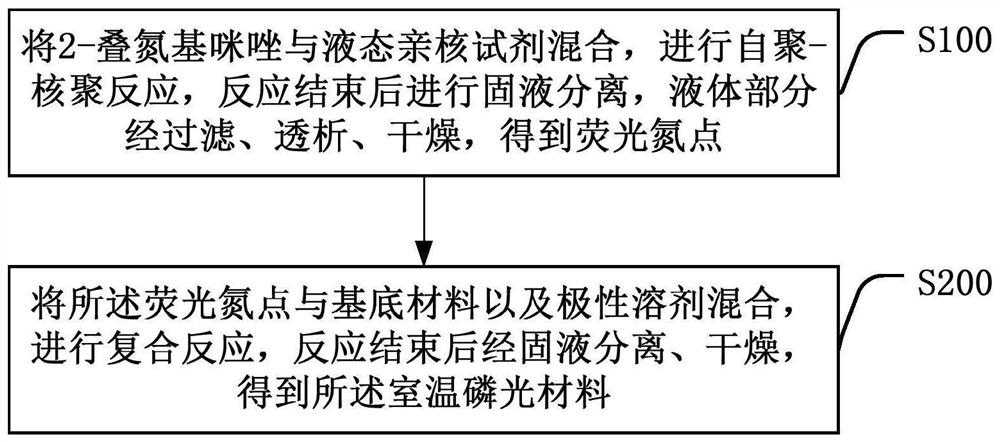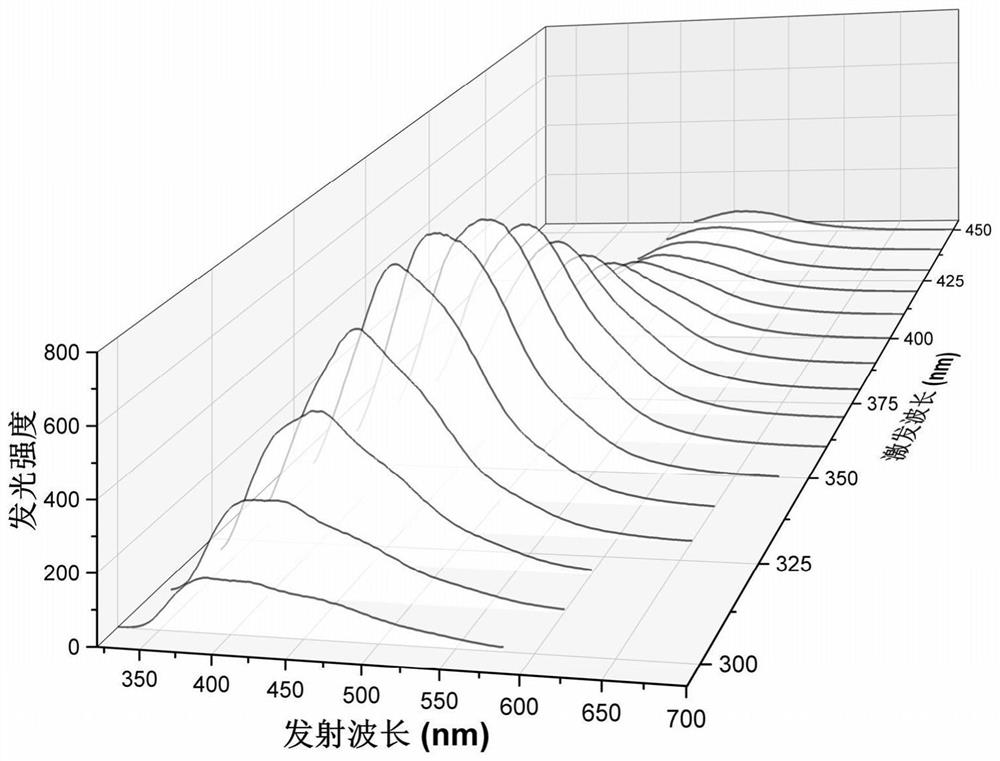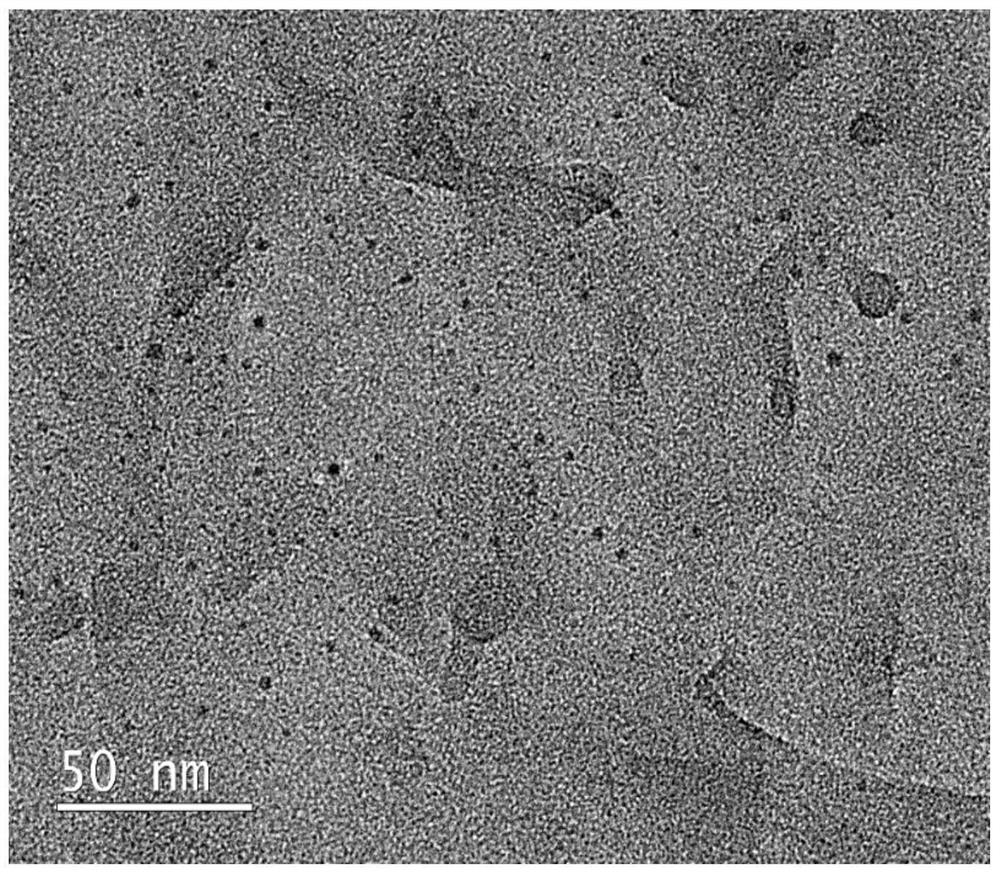Nitrogen point-based room-temperature phosphorescent material and preparation method and application thereof
A room temperature phosphorescence and base material technology, applied in the field of phosphorescence materials, can solve the problems of low fluorescence quantum yield, complex preparation process, few active sites, etc., and achieve the effects of strong luminescence, good reproducibility and less harsh conditions
- Summary
- Abstract
- Description
- Claims
- Application Information
AI Technical Summary
Problems solved by technology
Method used
Image
Examples
Embodiment 1
[0050] (1) 2-azido imidazole (structure is ) preparation
[0051] Take by weighing 4.09g 2-aminoimidazoles (structure is ) into the reaction flask, add 32mL hydrochloric acid (5.0mol / L), ice-water bath, add 2.77g sodium nitrite (48mL) aqueous solution while stirring; then add 16.3mL sodium azide (2.66g) aqueous solution, and react at room temperature for 2h. After the reaction, use NaHCO 3 Adjust the pH value to 7.0-7.5, extract with ethyl acetate (3 × 10mL), and use anhydrous Na 2 SO 4 Dry, filter, and rotary evaporate to obtain a yellow solid, which is then separated and purified by silica gel column chromatography (petroleum ether: ethyl acetate = 1:1), and rotary evaporated under reduced pressure to obtain the product.
[0052] (2) Preparation of fluorescent nitrogen dots
[0053] Weigh 1.0 g of 2-azidoimidazole and dissolve it in 100 mL of water, and react at room temperature for 12 h to obtain a crude fluorescent nitrogen dot product. Disperse the nitrogen point ...
Embodiment 2
[0058] Example 2 Room temperature phosphorescent material: preparation of Ndots@CA
[0059] According to fluorescent nitrogen dots and cyanuric acid (CA for short), the structure is ) with a mass ratio of 1:100, the aqueous solution of the fluorescent nitrogen point prepared in Example 1 is mixed with cyanuric acid, stirred at room temperature for 24h, centrifuged after the reaction, and centrifuged at a speed of 9000r / min for 25min after the reaction. The solid in the lower layer was freeze-dried for 12 hours to obtain a phosphorescent material at room temperature, which was named Ndots@CA.
[0060] At room temperature, the steady-state emission spectrum of solid-state Ndots@CA after a delay of 1 ms varies with the excitation wavelength as Figure 9 shown. It can be seen that solid-state Ndots@CA has excitation light-dependent phosphorescence properties, and its steady-state emission spectrum red-shifts with the increase of its excitation wavelength. At room temperature, ...
Embodiment 3
[0061] Example 3 Room temperature phosphorescent material based on nitrogen dots: preparation of Ndots@PVA
[0062] According to fluorescent nitrogen dots and polyvinyl alcohol (PVA for short, ) with a mass ratio of 1:50, the aqueous solution of the fluorescent nitrogen dots prepared in Example 1 is mixed with polyvinyl alcohol. Stir at room temperature for 3 hours, centrifuge at 11,000 r / min for 10 minutes after the reaction, and freeze-dry the lower solid for 48 hours to obtain a room temperature phosphorescent material, which is named Ndots@PVA.
[0063] At room temperature, the fluorescence spectrum of solid-state Ndots@PVA varies with the excitation wavelength as Figure 12 As shown; at room temperature, the steady-state emission spectrum of solid-state Ndots@PVA after a delay of 1 ms varies with the excitation wavelength as Figure 13 shown. It can be seen that solid-state Ndots@PVA has excitation light-dependent fluorescence and phosphorescence properties. At room ...
PUM
| Property | Measurement | Unit |
|---|---|---|
| particle diameter | aaaaa | aaaaa |
Abstract
Description
Claims
Application Information
 Login to View More
Login to View More - R&D
- Intellectual Property
- Life Sciences
- Materials
- Tech Scout
- Unparalleled Data Quality
- Higher Quality Content
- 60% Fewer Hallucinations
Browse by: Latest US Patents, China's latest patents, Technical Efficacy Thesaurus, Application Domain, Technology Topic, Popular Technical Reports.
© 2025 PatSnap. All rights reserved.Legal|Privacy policy|Modern Slavery Act Transparency Statement|Sitemap|About US| Contact US: help@patsnap.com



